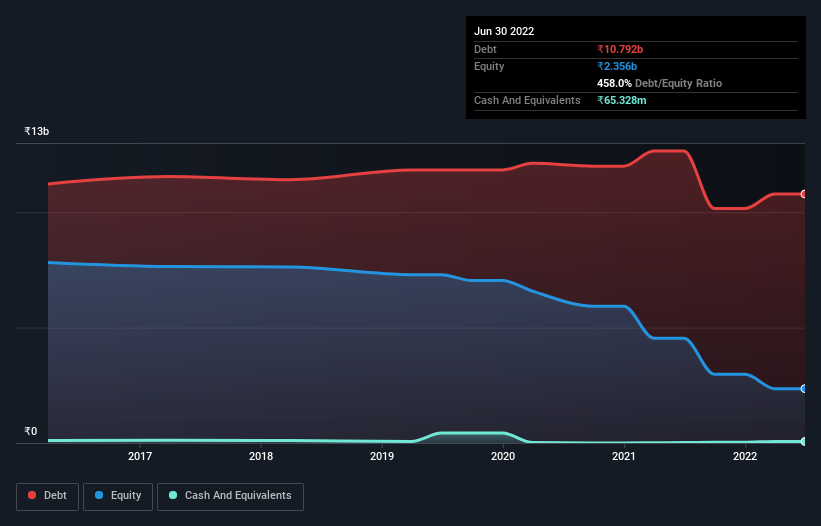- India
- /
- Hospitality
- /
- NSEI:ASIANHOTNR
Health Check: How Prudently Does Asian Hotels (North) (NSE:ASIANHOTNR) Use Debt?

David Iben put it well when he said, 'Volatility is not a risk we care about. What we care about is avoiding the permanent loss of capital.' It's only natural to consider a company's balance sheet when you examine how risky it is, since debt is often involved when a business collapses. We note that Asian Hotels (North) Limited (NSE:ASIANHOTNR) does have debt on its balance sheet. But the more important question is: how much risk is that debt creating?
What Risk Does Debt Bring?
Generally speaking, debt only becomes a real problem when a company can't easily pay it off, either by raising capital or with its own cash flow. Ultimately, if the company can't fulfill its legal obligations to repay debt, shareholders could walk away with nothing. However, a more frequent (but still costly) occurrence is where a company must issue shares at bargain-basement prices, permanently diluting shareholders, just to shore up its balance sheet. Of course, plenty of companies use debt to fund growth, without any negative consequences. The first step when considering a company's debt levels is to consider its cash and debt together.
Check out our latest analysis for Asian Hotels (North)
How Much Debt Does Asian Hotels (North) Carry?
You can click the graphic below for the historical numbers, but it shows that Asian Hotels (North) had ₹10.8b of debt in March 2022, down from ₹12.6b, one year before. And it doesn't have much cash, so its net debt is about the same.

A Look At Asian Hotels (North)'s Liabilities
According to the last reported balance sheet, Asian Hotels (North) had liabilities of ₹4.42b due within 12 months, and liabilities of ₹8.78b due beyond 12 months. Offsetting this, it had ₹65.3m in cash and ₹110.1m in receivables that were due within 12 months. So its liabilities outweigh the sum of its cash and (near-term) receivables by ₹13.0b.
The deficiency here weighs heavily on the ₹1.80b company itself, as if a child were struggling under the weight of an enormous back-pack full of books, his sports gear, and a trumpet. So we definitely think shareholders need to watch this one closely. After all, Asian Hotels (North) would likely require a major re-capitalisation if it had to pay its creditors today. There's no doubt that we learn most about debt from the balance sheet. But it is Asian Hotels (North)'s earnings that will influence how the balance sheet holds up in the future. So if you're keen to discover more about its earnings, it might be worth checking out this graph of its long term earnings trend.
In the last year Asian Hotels (North) wasn't profitable at an EBIT level, but managed to grow its revenue by 120%, to ₹1.7b. So there's no doubt that shareholders are cheering for growth
Caveat Emptor
Even though Asian Hotels (North) managed to grow its top line quite deftly, the cold hard truth is that it is losing money on the EBIT line. To be specific the EBIT loss came in at ₹85m. Reflecting on this and the significant total liabilities, it's hard to know what to say about the stock because of our intense dis-affinity for it. Like every long-shot we're sure it has a glossy presentation outlining its blue-sky potential. But the reality is that it is low on liquid assets relative to liabilities, and it lost ₹4.2b in the last year. So we think buying this stock is risky. There's no doubt that we learn most about debt from the balance sheet. But ultimately, every company can contain risks that exist outside of the balance sheet. For instance, we've identified 2 warning signs for Asian Hotels (North) (1 shouldn't be ignored) you should be aware of.
If, after all that, you're more interested in a fast growing company with a rock-solid balance sheet, then check out our list of net cash growth stocks without delay.
New: Manage All Your Stock Portfolios in One Place
We've created the ultimate portfolio companion for stock investors, and it's free.
• Connect an unlimited number of Portfolios and see your total in one currency
• Be alerted to new Warning Signs or Risks via email or mobile
• Track the Fair Value of your stocks
Have feedback on this article? Concerned about the content? Get in touch with us directly. Alternatively, email editorial-team (at) simplywallst.com.
This article by Simply Wall St is general in nature. We provide commentary based on historical data and analyst forecasts only using an unbiased methodology and our articles are not intended to be financial advice. It does not constitute a recommendation to buy or sell any stock, and does not take account of your objectives, or your financial situation. We aim to bring you long-term focused analysis driven by fundamental data. Note that our analysis may not factor in the latest price-sensitive company announcements or qualitative material. Simply Wall St has no position in any stocks mentioned.
About NSEI:ASIANHOTNR
Slightly overvalued with imperfect balance sheet.
Similar Companies
Market Insights
Community Narratives




